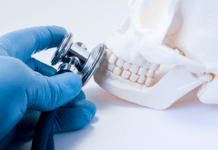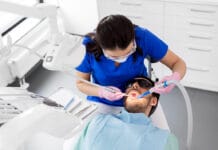After graduating from a dental hygiene program, new hygienists certainly are not thinking about stepping back into an educational institution. For most new graduates, a looming student debt needs to be tackled. As a result, practicing as a clinical dental hygienist is the most accepted and lucrative route when beginning a dental hygiene career.
It is well known that you do not get into education to get rich! Why would someone choose to leave a lucrative career as a clinical hygienist to take a pay cut and leave behind beloved patients? Let’s explore.
In the dental hygiene program, you likely had a course or two that discussed alternative options in dental hygiene—public health, educator, research, or sales, to mention a few. Quite possibly, you have visited many of the latest online forums where you read post after post of hygienists offering solutions to “getting out of the op.”
Luckily, you are now an experienced hygienist, and you have the tools to teach! I can recall saying these exact words, “I will never be a teacher. Teachers are saints and deserve raises for all the hard work they put into teaching.”
Many factors, however, can lead hygienists to become dental hygiene educators.
Factor: Musculoskeletal Issues
One common complaint is the toll that the career can take on the body. Let’s face it, when you no longer have the eagle eye of instructors watching you, you are contorting your body into a pretzel to access hard-to-reach areas, or you are adjusting your body to appease Mrs. Jones who cannot lay back too far in your chair (despite the fact that she lays down in a bed at night!).
Yes, you all know who you are. Most of you are doing this, and it is not benefitting you in the least. These body pains are leading you to massage therapists, chiropractors, and acupuncturists, and you consistently ask yourself, “How much longer can I do this?” “What will I do if I can no longer practice?”
To answer the above questions, a point will come when you no longer feel well enough to be a spunky, happy hygienist when encountering these ailments, and you will determine a RIP date for your dental hygiene career. For those of you who have not experienced this, pat yourself on the back because you are among the few who can brag about this, and, quite frankly, you are envied in this profession.
Guess who experienced extreme back pain? Guess who decided to go back for a dental hygiene completion degree? Yes, you guessed it; I did! I can attest that all my body issues are not completely resolved. But they are better now that I am now a dental hygiene educator. As stated above, teachers are saints and need raises. Teachers need raises for all the time and effort they put into educating future hygienists. Teaching is not for everyone. However, teaching might be for you even if you disagree.
Factor: Hygiene Burnout
Whether an experienced hygienist or a new graduate, hygienists experience hygiene burnout for a number of reasons:
- The pull between family and work obligations
- Too high of expectations from employers (including time constraints, production goals, stress, etc.)
- Musculoskeletal issues
- Loss of actual patient care in the hustle of the practice
You name it, and it can likely attribute to burnout. When hygienists lose their sense of self-worth in their field, they may begin looking at alternative careers, one of which could be educating future hygienists.
Factor: Job Satisfaction/Passion
As mentioned above, hygienists can lose their sense of self within the hustle and bustle of dental practices. Hygiene educators don’t experience the same sense of satisfaction they get when working directly with patients, but they do, however, gain satisfaction by watching students learn and grow into clinicians. It’s much like watching a baby deer grow, step by step, until they become more confident about conquering the world.
As an instructor you bear witness to all these steps and gain the satisfaction in knowing you have had a hand in these milestones: Exploring, taking radiographs, scaling, anesthesia, nitrous, anatomy, ethics, and so much more. Not only are you teaching the necessary skills to become competent, but you also guide these new hygienists in one of the most valuable assets needed − professionalism. Experienced, passionate dental hygienists are vital for walking alongside these students as they accomplish success.
Requirements Needed to be a Dental Hygiene Instructor
According to the Commission of Dental Accreditation (CODA) in their 2013 standards:
- Full-time faculty of a dental hygiene program must possess a baccalaureate or higher degree or part-time faculty providing didactic instruction must have earned at least a baccalaureate degree or be currently enrolled in a baccalaureate degree program
- All dental hygiene program faculty members must have a) current knowledge of the specific subjects they are teaching, b) documented background in current educational methodology concepts consistent with teaching assignments, and c) faculty who are dental hygienists must be graduates of dental hygiene programs accredited by the Commission on Dental Accreditation.
- Additionally, dentists and dental hygienists who supervise students’ clinical procedures should have qualifications which comply with the state dental or dental hygiene practice act. Individuals who teach and supervise dental hygiene students in clinical enrichment experiences should have qualifications comparable to faculty who teach in the dental hygiene clinic and are familiar with the program’s objectives, content, instructional methods, and evaluation procedures.1
With this information, one must recognize whether he or she has the skill set that is being recognized by CODA for becoming an instructor. If so, the journey will likely be easier. If not, it will be important to start researching what steps are needed to get the degree needed to work toward the goal of becoming a dental hygiene educator. There are many dental hygiene completion and graduate-level programs available, many of which are online that are ideal for completing the higher-level degree needed to work as a dental hygiene educator.
How Will Teaching Benefit me?
Being an instructor will have its ups and downs. All in all, though, it can be a rewarding career watching dental hygiene students flourish into eventual clinicians. While recently evaluating a student in using her ultrasonic on moderate calculus on the mandibular anterior teeth, I saw her light up like a child opening a gift at Christmas when she adjusted her technique and the calculus just “flicked” right off!
As an instructor, you will share in these joyous moments with your student and likewise walk alongside many other kinds of educational experiences and ah-ha moments that are priceless and plentiful.
While educating your students, you will also find opportunities for growth and learning while attending conferences and continuing education (CE) events. It was eye-opening when I recognized how many CE credits I was able to accumulate during the first year of teaching. In some states, being an instructor will also gain you CE credits. Some institutions may compensate the CE cost for you since you are accompanying the students; of course, this is case by case and not a guarantee. Additionally, you might be asked to attend Mission of Mercy events with your students, which is quite fulfilling for them as well as yourself.
Christmas, spring, and summer breaks! Enough said! Okay, more can be said, but having time off is one of the best things about being an educator. Breaks allow for a better work/family balance, which can increase the level of satisfaction in your career. However, this does not mean that there are not things to be done during those breaks, but working from home in your pajamas, yoga pants, or sweats is much more appealing than commuting to work for anyone!
In addition to time off, many institutions offer valuable benefits such as dental, health, life, and disability insurances that are often not offered in clinical practice. These benefits add up and are incredibly helpful in today’s day and age where all of these can be costly to consumers if they must purchase these on their own.
Conclusion
If you are asking yourself if this is a career path for you, seek out the advice of a respected dental hygiene educator at your alma mater, your local ADHA component meetings, or even post the question in an online forum to gather as much information as possible. When you have all the facts, it will be much easier to process. When advancing my degree, education was a thought, but I was not 100% sure that I would venture in that direction. Research and mentorship assisted me in the process.
Dental hygiene is a very rewarding career for most, but job satisfaction can be helpful and hurtful to have the best experience in your position, whether it is in a traditional or non-tradition route of practicing. If it becomes hurtful, exploring new options in the field will allow you to maintain your passion and offer a new approach to a career that has much to offer. Dental hygiene education allows clinicians to have the best of many worlds.
Educators often boast about having an ideal schedule while still utilizing their skills when teaching dental hygiene students to become the best version of themselves. While doing so, dental hygiene educators are still able to exude their passion for dental hygiene and maintain a level of job satisfaction on a different level. Is being an instructor all rainbows and Care Bears? No, it is not, but it is an avenue that can open new pathways within our field.
Now Check Out the Self-Study, Peer-Reviewed CE Courses from Today’s RDH!
Listen to the Today’s RDH Dental Hygiene Podcast Below:
Reference
Accreditation Standards for Dental Hygiene Education Programs. American Dental Association Commission on Dental Accreditation. Effective January 1, 2013. Retrieved from https://www.ada.org/~/media/CODA/Files/dental_hygiene_standards.pdf?la=en












